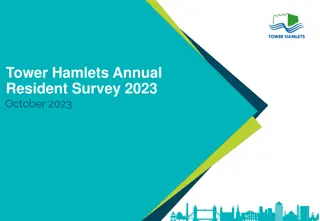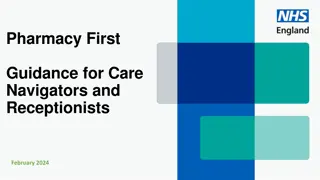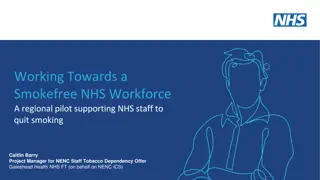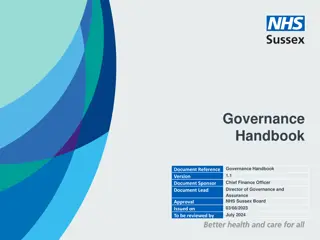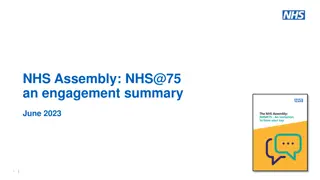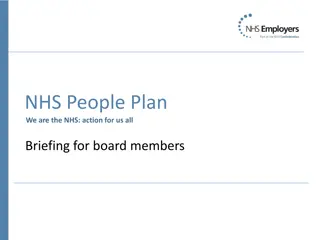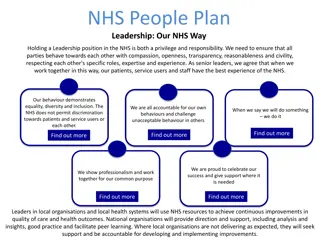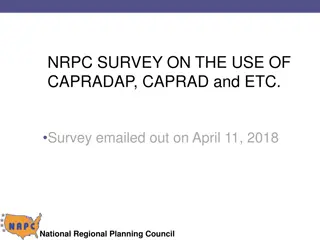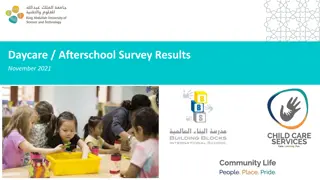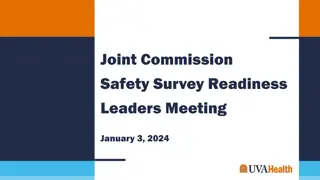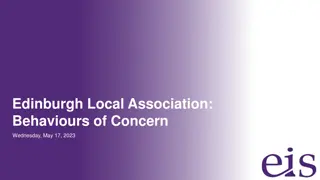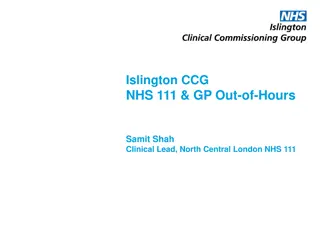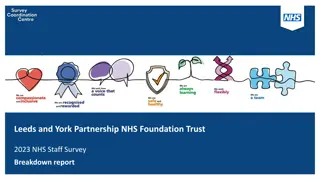
Insightful NHS Survey Data Revealed
Survey responses from a recent campaign provide valuable insights: Over 3,400 responses, 54 engagement events, 1.6 million social media post views, and key issues faced by respondents. Find out what people are saying, their priorities, and expectations for healthcare services. Explore the data to understand public sentiment towards the NHS and areas needing improvement.
Download Presentation

Please find below an Image/Link to download the presentation.
The content on the website is provided AS IS for your information and personal use only. It may not be sold, licensed, or shared on other websites without obtaining consent from the author. If you encounter any issues during the download, it is possible that the publisher has removed the file from their server.
You are allowed to download the files provided on this website for personal or commercial use, subject to the condition that they are used lawfully. All files are the property of their respective owners.
The content on the website is provided AS IS for your information and personal use only. It may not be sold, licensed, or shared on other websites without obtaining consent from the author.
E N D
Presentation Transcript
Some headline stats... Over the four-week campaign 3,427 survey responses. 54 engagement events, resulting in 1,123 face-to-face conversations. 1.6 million people saw our posts on social media. (Note: This data is in the early stages of analysis and may change in the final report. The information presented reflects only the main survey responses and does not include additional data sources such as Easy Read or Targeted Focus Groups.)
Our NHS the next chapter. We need to talk Who did we hear from? . Our online news articles generated more than 491,000 impressions 1.2% of respondents are system partners 78% of respondents are members of the public 20.8% of respondents are NHS staff 20% of staff respondents work for HNY ICB Our social media posts generated more than 3.7million impressions 5,695 people visited our dedicated webpage
What are people telling us? (Data subject to change) Headline stat: 98.0% of respondents say the NHS needs to change The top three problems people face that they would like us to prioritise solving are: 1. There are long waiting times to receive the advice, care or treatment I need (84.0%) 2. Health services don t talk to each other, and I have to tell my story over and over again (65.9%) 3. Health services are understaffed (65.6%)
What should be prioritised? (Data subject to change) Emergency Care (Immediate treatment of life-threatening Primary Care (GP practices, dental care, pharmacy) Although emergency care received Mental Health Care (care to improve or maintain a person's fewer total selections (2,163) than Social Care (care for those who need assistance with daily Critical Conditions Care (care for people with an incurable primary care (2,182) it was chosen Maternity & Neonatal Care (care provided for women and more often as respondents first or Planned Care & Diagnostics (when a patient visits a hospital second priority. Paediatric Care (care for children) Community Care (care provided outside of a hospital setting Care of the elderly (Care to help older people live This suggests that emergency care is Care for long-term health conditions (providing care and seen as more important to more End of Life Care (support for people who are in the last people than any other service. 4th Priority 1st Priority 2nd Priority 3rd Priority 5th Priority
Propensity to Travel Most people (+90%) expect to have access to Primary Care/Pharmacy services either digitally, To pick up a prescription, seek health advice or purchase over the counter medicines (Pharmacy) within walking distance or within a short car/bus I would expect to have access digitally and/or available within walking distance To receive non-urgent care by your GP, Practice Nurse or Health Care Assistant (Primary Care) journey. To receive care or treatment to improve your psychological and emotional-well-being (Mental Over half of people expect to have access to I would expect to travel a short distance (e.g short car/bus/cycle journey) maternity, urgent and emergency care within a 30 For a newborn baby(ies) who is unwell or born prematurely to receive specialist care after birth minute journey) To receive emergency care for a life-threatening injury and illness (Accident and Emergency Department) I would expect to travel further (e.g 30 minute + car/train/bus journey) There is more of an expectation to travel (30 min +) For a child(ren) to receive non-emergency treatment or diagnosis (Paediatric Care) for specialist care e.g. cancer treatment (73%) and To receive care during pregnancy, childbirth and the postnatal period (Maternity Care) I would expect to travel out of area (e.g 60+ minute car/train/bus journey to another county/region) for prearranged hospital treatment (61%). To receive urgent but non-life threatening care, for example, a sprained ankle or a minor burn (Urgent Most people would not expect to travel for more To receive specialist care for complex conditions, for example cancer care or specialist mental health care Not applicable to me than an hour/out of area, to receive treatment, To attend a pre-arranged appointment at a hospital or clinic for non-emergency treatment or diagnosis although nearly a quarter (23%) would expect to travel more than an hour/out of area for specialist care.
Move to Digital Which of the following activities do you regularly use technology for in your day-to-day life? People are 6 times more likely to use digital as their default for banking, than for managing their health. People are more likely to always, or often, use digital for education/learning, entertainment, communication, Health management (e.g NHS App, telephone/video appointments) remote working and online shopping than they are to Fitness Apps (e.g. Couch25k App, exercise tracking) manage their health. Education or learning (e.g online courses, tutorials) People are less likely to always use digital for their health Never Entertainment (e.g streaming, gaming, social media) management (including fitness) than all the other options Rarely the survey provided including education; Sometimes Communication (e.g email, text messaging, video calls) Often entertainment; remote working and online shopping. Always Remote working (e.g Zoom or Microsoft Teams) Online shopping (e.g purchasing clothing, ordering food) Online banking (e.g. checking balances, paying bills) 0 500 1000 1500 2000 2500 3000
Digital However, the vast majority of respondents said they would be willing to use technology to help with their care or to improve their overall health and wellbeing but in some areas more than others: The most likely, are: Ordering medication online; telephone calls and NHS App. People are currently receptive to, but less likely to use digital for video calls (e.g. from GP) and for other health and wellbeing Apps. One respondent told us: The use of at-home monitoring must become more common.
Prevention (Data subject to change) The top 5 things people are The top 5 things stopping The top 5 answers given to doing to make positive people from making positive what people think they could changes to their health and changes to their health and do to improve their health and wellbeing are: wellbeing are: wellbeing are: 1. Increasing exercise (1,527) 1. Motivation & willpower (1,132) 1. Increasing exercise (1,354) 2. Improving diet (1,481) 2. Time constraints (1,010) 2. Reducing anxiety/stress (1,248) 3. Improving mental health (761) 3. Habitual behaviours (760) 3. Improving diet (1,075) 4. Reducing stress/anxiety (756) 4. Financial barriers (615) 4. Improving mental health (991) 5. Finding friends and support to 5. Mental health issues (553) 5. Living in a supportive community not be lonely (452) (662)
Prevention (Data subject to change) Time taken up by life admin. It takes hours to fill in forms online, even at the dentist you have to fill in your form online before going instead of just doing it on paper in the office. Life is too busy. I m a single mum of four, there is way more to think about before I get to me. Keeping active and mobile is so important! Sometimes this can just be gardening or going for a short walk in the fresh air. More volunteering opportunities should be advertised by the NHS. Lack of availability of fitness classes/swimming pool opening times outside work hours.
What is most important to people? (Data subject to change) I can get the care I need to look after my general health and wellbeing My care is centered around my needs, and I am listened to There are enough staff with the right skills and experience I can stay healthy and manage my health in a way that works for me I know specialist services will be available somewhere when I need them I am cared for in well-maintained locations that have up-to-date equipment I am treated in a fair and inclusive way, irrespective of who I am I am able to get there Services are good value for money
What is most important to different communities? (Data subject to change) North Yorkshire Hull North East Lincolnshire I can get the care I need to look after my general health and I can get the care I need to look after my general health and I can get the care I need to look after my general health and There are enough staff with the right skills and experience There are enough staff with the right skills and experience My care is centered around my needs, and I am listened to My care is centered around my needs, and I am listened to My care is centered around my needs, and I am listened to There are enough staff with the right skills and experience York North Lincolnshire East Riding of Yorkshire I can get the care I need to look after my general health and I can get the care I need to look after my general health and I can get the care I need to look after my general health and There are enough staff with the right skills and experience My care is centered around my needs, and I am listened to There are enough staff with the right skills and experience My care is centered around my needs, and I am listened to There are enough staff with the right skills and experience My care is centered around my needs, and I am listened to
What is most important to different groups of people? (Data subject to change) Young People (0-24 years) Disability BAME I can get the care I need to look after my general health and I can get the care I need to look after my general health and I can get the care I need to look after my general health and My care is centered around my needs, and I am listened to My care is centered around my needs, and I am listened to My care is centered around my needs, and I am listened to There are enough staff with the right skills and experience There are enough staff with the right skills and experience There are enough staff with the right skills and experience Learning Disability Older People (75-85+ years) LGBTQ+ My care is centered around my needs, and I am listened to I can get the care I need to look after my general health and I can get the care I need to look after my general health and I can get the care I need to look after my general health and My care is centered around my needs, and I am listened to There are enough staff with the right skills and experience There are enough staff with the right skills and experience There are enough staff with the right skills and experience My care is centered around my needs, and I am listened to
What is most important to different groups of people? (continued) (Data subject to change) Long-Term Health Condition Staff I can get the care I need to look after my general health and I can get the care I need to look after my general health and My care is centered around my needs, and I am listened to There are enough staff with the right skills and experience There are enough staff with the right skills and experience My care is centered around my needs, and I am listened to Mental Health System Partners I can get the care I need to look after my general health and I can get the care I need to look after my general health and My care is centered around my needs, and I am listened to My care is centered around my needs, and I am listened to There are enough staff with the right skills and experience There are enough staff with the right skills and experience
The knowledge and awareness people need around healthy behaviours, eating healthily, exercise, adopting good habits isn't promoted or encouraged widely enough. Mental Health BAME Emergency care and mental health care are considered joint top priority services for this cohort. Maternity and neonatal care is significantly more important to this cohort compared to others, as they are the only group to rank it as their 4th priority service to focus on if the NHS receives no additional funding. 89.5% (119) respondents, believed that improving their mental health could enhance their overall The issue of services not being inclusive received the fewest health and wellbeing. However, only 62.2% (74) of selections from this cohort (8.6%, 7) when asked which those 119 are currently working to improve their problems they wanted us to prioritise solving. mental health, with the main barrier being that their mental health is preventing One size doesn't fit all, and not all conditions can be helped with "have you tried losing weight?" I suffer with depression, struggle with body image and being asked if I have tried losing weight isn't always conducive to me feeling better about myself. A higher proportion of respondents (59.74%) from this cohort them from focussing on are actively trying to improve their diet to enhance their overall health and wellbeing compared to those who believe their physical health that eating healthier could improve their health (51.9%). (81.2%, 108).
Long-Term Health Condition LGBTQ+ When asked what could improve their overall health and For half of this group, emergency care is their top priority wellbeing, all LGBTQ+ respondents said improving mental with primary care as second They strongly prioritise addressing waiting times and health and emotional wellbeing. This group ranked fairness and inclusivity higher than any communication between services other group. Almost all of this group said understaffing and long waiting More half of this group said increasing exercise levels times for care, advice or treatment were something to would improve overall health and wellbeing prioritise resolving. I would prefer to have the opportunity for prescriptions to join gyms or for nutritionist advice than be given medication. Run the gender identity clinics - better having them hire more specialists to get the 10 year waiting times down.
Ironically, it is working in the NHS that has a negative impact on my physical and mental health. Routinely doing 12-hour days as a GP is not consistent with sustaining a healthy work life balance. Young People Staff Young people placed mental health care as a higher priority than other groups, this being the second Staff were more likely to report time constraints as a priority for them. barrier to health and wellbeing than others. They strongly felt that waiting times for treatment Staff felt emergency care and critical conditions should need addressing. be prioritised. They strongly felt waiting times for Young people placed more importance on treatment are a priority. inclusivity than others, and ranked this higher at They placed having enough staff with the right skills 5thplace. slightly higher than others, We need to value our experienced staff if we are to retain a skilled workforce before they all leave for better jobs, it s not solely about pay. in second place. Make services inclusive and accessible for those with hidden disabilities.
Colleagues share patient stories and emerging themes gathered through face-to-face conversations .


